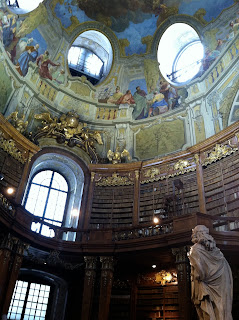Inside the National Library
in Vienna, Austria
with THE BOOKJEANIE
While spending time in Vienna last month, I stopped by the magnificent Austrian National Library housed in a separate wing of the Hapsburg Palace. The beginnings of the state library date back to the 14th century but the creation of a court library in a permanent structure was initiated in 1722 by the Holy Roman Emperor, Charles VI. The baroque State Hall (Punksaal) is considered one of the most beautiful historical libraries in the world and houses more than a 8 million books and objects.
"What is on that man's back?" you might wonder. It seems that materials are transported throughout the library on these wooden shelves attached by leather straps to the poor librarian's shoulders. Looks like a medieval torture device - maybe this fellow is being punished for misshelving books . . .
An eight-year-old girl is separated from her family and sent to a detention camp simply because her parents are middle class intellectuals. Shoved into a filthy room in a run-down dormitory, she finds herself alone with her four-year-old sister.
After scrounging coal to fuel a small cooking stove, boiling water for them both to drink and cooking the small amount of rice that she found in an old jar, Ping Fu struggles to comprehend what her life has become. As she states in this heartbreaking memoir of her childhood during the Cultural Revolution in China, "From that moment on, I would never again be a child at my parents' side, under their protection and guidance. The boat on the long river of life was in my hands alone." Ping cared for her sister, Hong, and made it through the next ten years by remembering the qualities that her father valued above all: strength, courage, resilience. Eventually Ping would find her way to the United States, discover her passion in technology, and become the founder and CEO of Geomagic, a 3D digital reality solution company. Honesty, integrity, and humility are the qualities that characterize Ping Fu, a devoted mother and successful entrepeneur. Her memoir has recently unleashed a flood of criticism and attacks from Chinese bloggers in an effort to discredit her but she stands strong and tries to explain a political and economic climate that would spawn such vindicative behavior. Ping Fu's story serves as an inspiration to anyone who has suffered humiliation, deprivation, or brutality: "I write today not because of what I have become but because of the nobody I once was. . . I can relate to wild success, utter poverty, and everything in between. . . I have developed flexibility and compassion for those experiencing the struggles that we all face." Whatever your own experiences, you will not fail to be moved by the story of this strong, courageous woman. Alone in the Kitchen with an Eggplant: Confessions of Cooking for One and Dining Alone edited by Jenni Ferrari-Adler.
As a person who often eats alone, I read this collection of essays with delight as well as dismay. Delight, because many of the contributing writers truly enjoy the quiet, solitary joys of dining alone, happy to create meals to enjoy and appreciate solely for oneself. Dismay, because so many others view themselves and others in such circumstances as somehow deprived and not worthy of a fulfilling meal. Cooking is characterized as an act of love, something that needs to be shared, rather than narcissistically enjoyed alone. Fortunately writers like Laurie Colwin reflect nostalgically upon the solitary evenings spent in a tiny apartment trying to create more and better ways to prepare the homely eggplant, ". . .the stove-top cook's strongest ally." Colwin makes the case that dining alone is one of life's pleasures and I totally agree. But that said, dining with this book in hand is a real delight.
Summer is a great time for . . . reading!
See you next week.










Comments
Post a Comment